Gae Polisner's Blog, page 6
November 20, 2015
School visits, new book in the works and other catching up...
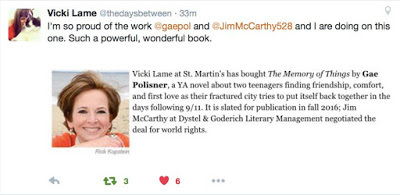 Publishers Weekly announcement for my next book,
Publishers Weekly announcement for my next book,THE MEMORY OF THINGS
Hey, peeps!
Been a while since i played catch up.
 Been a busy early fall with writing and revisions, school visits, open water swimming, dog walks and beautiful leaves, and, finally, the announcement of THE MEMORY OF THINGS, coming September 2016.
Been a busy early fall with writing and revisions, school visits, open water swimming, dog walks and beautiful leaves, and, finally, the announcement of THE MEMORY OF THINGS, coming September 2016.*points up to shiny PW announcement*
To say I am excited about this book is an understatement, and as early blurbs from respected writers come in, and enthusiasm from my awesome editor, Vicki Lame, and awesome publisher, St. Martin's Press, mounts, well, the excitement only builds.
As always, I find myself trying not to wish away the seasons in between, just so I can get to the release...
For sure, I know by this point that all of it is so fast and fleeting, I need to milk and enjoy every moment, and let the new book arrive in its own good time.
Having said that, OMG, I CANNOT WAIT!!! (and, at least wouldn't mind the cold dark, post-holiday winter moving swiftly along...)
In addition to work on the new book and a new manuscript (of course...), I've had some amazing school visits and author events this fall. Three highlights:
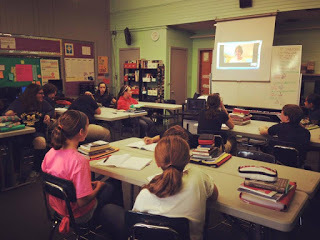 Paid some Skype visits with Ms. Shaum's various 8th grade classrooms who are Nanowrimo'ing for the month of November. OH MY GOSH, GUYS!! DO YOU KNOW HOW LUCKY YOU ARE TO BE NANOWRIMO'ING?!?! That you have a teacher who finds the time -- makes the time -- to let you spread your creative wings?!?!? If only my boys had had English teachers who did that... but, um, I digress...
Paid some Skype visits with Ms. Shaum's various 8th grade classrooms who are Nanowrimo'ing for the month of November. OH MY GOSH, GUYS!! DO YOU KNOW HOW LUCKY YOU ARE TO BE NANOWRIMO'ING?!?! That you have a teacher who finds the time -- makes the time -- to let you spread your creative wings?!?!? If only my boys had had English teachers who did that... but, um, I digress... Yes, he has a signed copy of THE SUMMER
Yes, he has a signed copy of THE SUMMEROF LETTING GO in his hand... #nErDcampLI: Had an incredible day participating in the first ever Long Island nErDcamp (a/k/a: nErDcampLI). OMG, LI educators: DO YOU KNOW HOW LUCKY YOU ARE THAT YOU HAVE A nErDCAMPLI now?!?!?!?!
Here's a post about that from the uber-awesome Joellen McCarthy, one of its extraordinary facilitators and person you want to know: Spreading the PD Love. You can also follow the hashtag on twitter for updates.
As for photos, I could share some of me, but honestly, the one immediately above is one of my favorites from the day. The whole scene was so exuberant and contagious, the hard working custodial staff came by to the booksale after a ridiculously long day, to chat with the authors and buy books!
And, last, but definitely not least, I finally paid an in-person visit to a school I have Skyped with many times: THE DAVID BREARLEY MIDDLE SCHOOL in Kennilworth, NJ. It was truly one of the highlights of my author life so far.
Just walking through the school's halls and courtyards will begin to show you what creativity goes on in that school, led by the enthusiasm and dedication of English teacher Nicole Warchol and art teacher Janice Marsili (who was just honored as a Teacher of the Year with good reason!). I couldn't stop taking pictures and leaning close to read each incredibly original and evocative 8-word memoir, quote, and musing:






Ridiculously inspiring... and that is only a handful of the artful spots that beautify the school, all teacher and student created!!!
Of course, that feast for the eyes and senses was just the beginning.
I spent the day with Ms. Warchol's 7th graders talking writing and doing five minute writing exercises inspired by my writer pal Jo Knowles' White Page List Poem she shared last summer during Teachers Write!
Throughout the day, a few of my 8th grade favorites from last year when we Skyped (sorry, here I play favorites...), stopped in to say hi. These kids were so connected after our visits that we've all become good friends staying in touch through twitter and Instagram, and I don't think any of us could hug the other enough. After school, they interviewed me for the school paper and then we headed to the library for a THE SUMMER OF LETTING GO book club, for which more than 50 students, administrators, librarians, teachers and parents showed up and stayed for our more than 2-hour discussion!
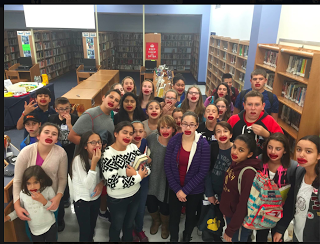
At the end, we ate cake (you can see the awesome cake in the photo montage above!) and then I read aloud from the first ten pages of THE MEMORY OF THINGS for the first time ever. To say the reaction was enthusiastic... well, that, too, would be an understatement.
 with my sweet, smart pals: Rae, Sarah, Justin & JoeSo that's catch up! Still hoping to eke out a few more open water swims before the holidays and bone-cold winter set in.
with my sweet, smart pals: Rae, Sarah, Justin & JoeSo that's catch up! Still hoping to eke out a few more open water swims before the holidays and bone-cold winter set in.Love to you all,
gae
Published on November 20, 2015 08:03
August 6, 2015
Friday Feedback: Already So Long, My Usual Parting "Gift" and Some Other Cool Stuff...
This is me. Here in my swim cap and bathing suit poised on the edge of the pool.
(Why YES this is an excellent way to ruin your iPhone if you're not careful. Thanks for asking...)
At any rate.)
I'm here, hanging on to summer because:
WAAAAAAH.
I mean, BIG OL' WAAAAAAHHHHHHHHHH!!!!!! Only bigger than that.
As usual, I don't want summer to end.
I don't want Teachers Write to be over.
I don't want you or my own kids to go back to school.
I'm on the end-of-summer precipice for realz over here.
It isn't pretty, and it gets worse every year.
*breathes*
Alas, here we are at the end of these things, and, this, the final FINAL unofficial Friday Feedback of the 2015 Summer. I can't tell you all how much it means to me that so many of you stop here week in-week out, chime in, and dig down to do the real nitty gritty brave of sharing your writing. I'm proud of you, even if I really have no right to be.
And my guest authors were pretty darn impressed by you too!
As such, I want to offer a few parting gifts (and other cool stuff):
First: for those of you who participated here on Friday Feedback regularly this summer and plan to continue on with your writing toward a goal of publication, I make you this standing offer: When you are ready, you may ask me for help with your agent query letters. Trust me, they're a stress-inducing beast, and I'm fairly decent at them, so when you're ready, find me here: g.polisner@gmail.com.
BUT before you send me any query, please do read THIS POST on some dos and don'ts of query letters FIRST (fyi, you can skip all the dog stuff and scroll down!), and THIS awesome POST by agent John Cusick too!
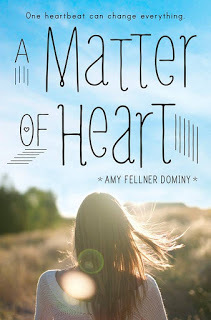
Second: Remember the talented Amy Fellner Dominy who did the fabulous exercise on character mapping? Author of OyMG (just chosen as a PJ our Way Reading Program selection!) and her new pulse-pounding young adult novel, A MATTER OF HEART?
Well, Amy has a few author copies left of "HEART" and has offered to give away some classroom copies here! So IF your classroom is ages 12+ and you're interested, please say so in the comments with what grades you work with. We'll draw a few random names and hook you up!
And, third: frantic about heading out into the wild west of novel writing on your own?!?!? Have no fear, a new awesome resource for you is here!

Remember the lovely Martha Brockenbrough who was here in July with her extraordinary post on The Art of Persistence?! Author of the beautifully woven THE GAME OF LIFE AND DEATH?
She asked me to tell you about her new novel coaching program, Nothing to Novel, that she's started with a few other talented author friends. Martha invites you to explore the website and sign on for some services when you are ready! Is there anyone better to seek advice from? I can answer that for you: There is not!!!

And that's that, my lovely, shiny campers, like it or not, TW Summer 2015 is in the books.
But since we're here and it's Friday, why not a little Friday Feedback as a send off?
You know the rules. Feel free to share an excerpt in the comments one last unofficial summer of 2015 time.
No excerpt from me today. This is all about you.
For those of you still wringing out more summer like I am, ENJOY!
For those returned or returning to classrooms imminently, I wish you a joyful school year. And if any of you use my books in the classroom or library, etc. please reach out to me about making a Skype visit to your school!
-gae
Published on August 06, 2015 19:35
July 30, 2015
Friday Feedback with Selene Castrovilla: Voice - The Heart of Your Story
 Me, in my other true element.
Me, in my other true element. Ah, dear campers,
Somehow, too quickly, this is the last "official" Friday Feedback of our 2105 Teachers Write! summer.
How ridiculously unfair!
I will post an unofficial wrap up with gifts, advice, links and giveaways next Friday, and welcome as many of you who still have time and stamina to show up there! I also remind you to read through the comments on our "So You Want to Join a Critique Group" post and chime in if you want to make connections there.
 Now, without further ado, today's pretty amazing guest author, Selene Castrovilla* author of several picture books including the award-winning REVOLUTIONARY FRIENDS, as well as several young adult novels, is here to talk about that ever elusive and ever important, "VOICE" in story. How to find it and what it means.
Now, without further ado, today's pretty amazing guest author, Selene Castrovilla* author of several picture books including the award-winning REVOLUTIONARY FRIENDS, as well as several young adult novels, is here to talk about that ever elusive and ever important, "VOICE" in story. How to find it and what it means.Selene's most recent YA novel, MELT, "a brutal love story," has sure got a strong one going throughout! I know because I've read it. More particularly, I tore through it, heart-racing, and you will too.
MELT has garnered SIX honors and awards, and none other than Jacqueline Woodson (BROWN GIRL DREAMING) has said about Selene & MELT that Selene is " . . . a writer worth watching. "
Jacqueline Woodson, so, I mean, it doesn't get much better than that.
p.s. the original post on voice sent to me by Selene was over 14 pages long! Um, FOURTEEN PAGES!! Too long for a blog post, but, gosh, don't you just love our guest authors?!? If you would like to read the entire post, with its many incredible examples, feel free to email me (g.polisner@gmail.com) and I will forward it to you for your reading pleasure!
Now, here's Selene:
 We often refer to voice in this most mystical sounding way: “You found your voice!” And while there is an ethereal aspect to writing which cannot be taught, voice is in fact something stemming from craft. Voice is not inspiration. Voice is the result of the writer transitioning inspiration into story using specific tools and techniques. Voice is the result of damn hard work and determination.
We often refer to voice in this most mystical sounding way: “You found your voice!” And while there is an ethereal aspect to writing which cannot be taught, voice is in fact something stemming from craft. Voice is not inspiration. Voice is the result of the writer transitioning inspiration into story using specific tools and techniques. Voice is the result of damn hard work and determination. Patti Lee Gauch, one of the greatest children’s book editors, asks this question of writers: “Did you go far enough?”
Voice is what happens when you go far enough.
"Voice is the heart of your story. Literally: it is the mighty muscle though which our story’s life’s blood circulates and flows. Figuratively: It is the core, it is the essence. It is the truth."
Voice is the heart of your story. Literally: it is the mighty muscle though which our story’s life’s blood circulates and flows. Figuratively: It is the core, it is the essence. It is the truth.
Voice separates mediocre and even good writing from great. Voice is what makes you root for the hero, and even feel for the anti-hero. Voice leads to total immersion; comprehensive investment by the reader. If you put a book down without finishing, its voice did not compel you.
Voice is the way your story is told, in every aspect. It requires meticulous attention to details.
Everything we include in our story must circulate through voice.
Here’s how:
Character
Character is, of course, where we start. Plot stems from character. Because it is your character’s personality that determines where they will head, and how they will react to their circumstances. If Harry Potter had been a little jerk, things would’ve gone done differently at Hogwarts.
If you love a book you love the character’s journey (even if they are anti-heroes, you can can still enjoy their ride to either redemption or ruination.) Your character is your voice, because your story stems through his perceptions and experiences and choices. But we must develop this voice carefully and completely.
How do we present our character’s voice effectively? We must know it intimately. We must become this character.
Examples:
The Catcher in the Rye by JD Salinger:
“If you really want to hear about it, the first thing you’ll probably want to know is where I was born, and what my lousy childhood was like, and how my parents were occupied and all before they had me, and all that David Copperfield kind of crap, but I don’t feel like going into it, if you want to know the truth.”
What if it had been written like this:
“I don’t feel like talking about my childhood. Especially not my parents.”
It boils down to the same information, but it lacks the voice. See the difference!?
Setting
It’s not enough to describe a powerful setting. This setting must be seen through the voice: the eyes and mood of your character. And if there’s more than one point of view, you must accomplish this multiple times. This is the most commonly ignored element I see. Your setting is not just a description of a place because no two people see a place the same way.
Examples:
Last Night I Sang to the Monster by Benjamin Alire Sáenz
“Somebody put a calendar on the bulletin board in my room. I guess they wanted to make sure I knew what day it was. I think I heard a voice say, ‘You can make the days.’That’s a funny thing to do with days. Mark them. Put an X on them. Cross them out.”
What if it had been written like this:
“There was a calendar in my room. They said I could mark off the days.”
America by E.R. Frank
“You have to watch what you say around here because everything you say means something and somebody's always telling you what you mean. ‘Step off,’ I tell this nurse when she tries to get me to eat. ‘You mean, thank you for caring,’ she says. ‘You’re welcome.’ ‘I need a lighter,’ I tell her, and she goes, ‘You mean you want a lighter. Dream on, sweetheart.’ So I take their medicine and walk around in socks the ay they make you, and stay real quiet.”
What if it had been written like this:
“I’m stuck in this hospital where everything is misconstrued. So I comply with their rules and stay quiet.”
Sensory Details
The sensory details our character observes are totally dependent on that character’s state of mind, which lends to voice.
Examples:
The Catcher in the Rye
“Then she introduced me to this Navy guy. His name was Commander Blop or something. He was one of those guys that think they’re being a pansy if they don’t break around forty of your fingers when they shake hands with you. God, I hate that stuff.”
What if it had been written like this:
“She introduced me to her date, a Navy fellow. He had a strong handshake.”
Precision of Language
We have a rich language. So many words mean basically the same thing, but they possess different moods and shades. The texture of the words we choice weaves voice.
If you want your character to appear depressed or downtrodden, have them plod across the floor. If they are playful, have them scamper. When I wanted my character to be disdainful to the legal process (and in general), I gave him the line: “The assistant DA rolls in.” I could’ve used “strolls,” but “rolls”says so much more. That sentence has voice.
Sensory words
I also like to use words that have a sensory feeling to them, in conjunction with the voice:
glints - shiny, but it feels sharpstammers - struggles to get words out, but with a brutal, stamping feel
Gustave Flaubert famously coined the term “le mot juste:” the right word. He labored to find the precise word which would reveal the truth on the page. I, too,believe that we must search for le mot juste. In fact, I find great satisfaction in this thrill of the word chase. One of my great joys is using my Flip Dictionary (by Barbara Ann Kipfer, published by Writer’s Digest books.) It’s a thesaurus on steroids. Meant for writers, it will provide you with inspiration and aha! moments to enrich not only your story, but also you.
Here’s an example of both precision of language & sensory words:
As I lay Dying by William Faulkner
“It’s because he stays out there, right under the window, hammering and sawing on that goddamn box. Where she’s got to see him. Where every breath she draws is full of his knocking and sawing where she can see him saying See. See what a good one I am making for you. I told him to go somewhere else. I said Good God do you want to see her in it. It’s like when he was a little boy and she says if she had some fertilizer she would try to raise some flowers and he taken the bread pan and brought it back from the barn full of dung.
And now them others sitting there, like buzzards. Waiting, fanning themselves. Because I said If you wouldn’t keep on sawing and nailing at it until a man cant sleep even and her hands laying on the quilt like two of them roots dug up and tried to wash and you couldn’t get them clean.”
What if it was written like this:
“Cash is building my mother’s coffin right under her window. And the rest of the family sits in her room waiting for her to die.”
Pacing
Never underestimate the power of pacing to influence your voice. Pacing runs side by side with word choice, because the words you use determine your pacing. Short, staccato word chains create a different pace that long, weightier words.
Play with words as you build your sentences!
stumbles vs. tripscollapses vs. fallswounded vs. hurt
Shift in voice
Voice can also do a shift. It can be dark to darkest, as in Macbeth by William Shakespeare
In the beginning Macbeth says:
“Come what come may,Time and the hour runs through the darkest day.”
In the end he says:
“To-morrow, and to-morrow, and to-morrow,Creeps in this petty pace from day to dayTo the last syllable of recorded time,And all our yesterdays have lighted foolsThe way to dusty death. Out, out, brief candle!Life's but a walking shadow, a poor playerThat struts and frets his hour upon the stageAnd then is heard no more: it is a taleTold by an idiot, full of sound and fury,Signifying nothing.”
It can be hopeless to hopeful, as in You Don’t Know Me by David Klass:
In the beginning John says:
“You don’t know me.Just for example, you think I’m upstairs in my room doing my homework. Wrong…And I am not in this house at all. I am in the middle of a hurricane. Thunder is cymbal-crashing above and beneath me. Lightening makes my hair stand up. Winds are spinning me like a top…You don’t know me at all.”
In the end he realizes:
“I look up into your eyes and I see the truth there, and I admit that I was mistaken all along.So you do know me, Mom.So you do know who I am after all.”
But this shift must be a consequence of the character’s journey. It can't appear out of nowhere. If that happens, the reader is at the least dissatisfied, and at the most disgusted. An unjustified shift of voice at the end is what makes us “hate that book” even if we enjoyed it to that point.
I hope this has helped you. (Oh, it has, Selene!! It has! It's a pretty extraordinary post!)
And, now, since it's Friday Feedback, let's share bits of our work that reflect a strong moment of voice. Here's a moment from SIGNS OF LIFE, the sequel to MELT, due out January 2016! And if you're new to Friday Feedback, don't forget to scroll to the bottom of this link to read THE RULES.
xox Selene (& gae)
Joey –Now
I ain’t talked with her for almost a year. Scratch that. Shit. Grammar is a biatch. Do I get points for substituting ‘biatch’ in for the word I’d normally use? Doubtful. Mrs. Baker’s not cutting any breaks for stuff like that. She would say it would be better for me to avoid all such terms. She would go, “Grammar is unpleasant, Joseph. I believe that is what you meant to convey.” Not go. Say. “People ‘say,’ Joseph.” That's what Mrs. Baker would say. “They speak.” Right, Mrs. Baker. You're absolutely right. People speak. Except when they don’t. Except when they can’t. Sometimes they ‘go,’ but it has nothing to do with speaking. Or leaving for that matter. Sometimes they go even when they’re here, and that sucks. Oh, sorry Mrs. Baker. I mean, that is unpleasant. But really, it sucks. I promised her I’d graduate, and go to community college. Not Mrs. Baker. Doll. I promised Doll. I didn’t think I’d get in to the college, but she said “Try, just try,” and so I applied, and they took me. Go figure.
Published on July 30, 2015 20:18
July 29, 2015
Teachers Write: So You Want to Join a Critique Group?
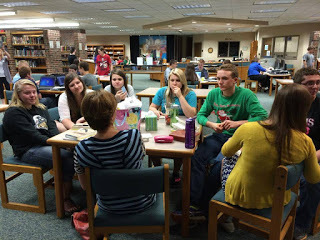
So you want to join a critique group?
Often, during the summers, as our #teacherswrite campers start really writing and developing story as well as seeing the benefit of getting and sharing constructive feedback with like-minded others, they start craving a critique group, and we here at Teachers Write like to help you to do that if you so desire.
In the past, we’ve had several of our campers find members of such critique groups through Teachers Write and many of those groups are still going strong, and if you are one of them, we would LOVE you to chime in in the comments about how you found yours, what has worked for you so far, and what adjustments, if any, you've had to make, etc.
But first, in order to help you if you've never been in one, let’s talk about how critique groups work, and then we invite you all in the comments to make any potential connections you might want to pursue.
What they are and how they work:
(Please note: The rest of the following information is taken, in large part, verbatim from KateMessner’s Teachers Write! blog post from last year unless in pink font, in which case it is me, chiming in!
To see Kate’s full post in its entirety, please click on THIS LINK):

"A critique group is a small group of people (usually 2-6) who write and agree to read one another’s work from time to time and provide feedback with the purpose of helping one another improve. Critique groups can happen in person — if you live close to some other writers, you might agree to meet once a month at the local coffee shop for this — or online, in which case you’d exchange pages of writing via email or set up a system with folders in Yahoo Groups or something similar.
Critique groups can be made up of people who are at about the same level (beginners, folks revising first novels, etc.), people who write the same genre (YA, MG, picture books, nonfiction, etc.) or people who write different kinds of work but have an appreciation for what the others write, too." Perhaps, as you’ve been sharing feedback and other notes in the comments these past weeks, you feel yourself gravitating toward a particular person whose writing continually moves you or who you feel you share common writing goals with. Each time their name pops up you feel happy or excited to “see” them and wish you could write with them in real life. That could be just the critique partner for you! This is the time to reach out to them, if you haven’t done so already.
"Sometimes, critique groups operate on a schedule (each week, writers take turns sending maybe five pages for critique by the others) and sometimes they’re more informal (people share work when it’s done or when they need feedback, and others critique as they can. This is more common with experienced writers, I think, who tend to have deadlines and less predictable schedules.)
"Sometimes, it takes a while to find the right critique group. People sometimes post about forming new critique groups or about openings in established ones at the SCBWI siteor on Verla Kay’s discussion boards for children’s writers. Sometimes, you express interest in this, and someone else has filled the spot already or seems to be a better fit for that particular group. Do not take this personally or read anything into it at all. It happens. It happened to me numerous times when I was looking for a critique group, and if it happens to you, it doesn’t mean that you’re not a good writer or a nice person or anything else. It only means that your “just-right” critique group is still out there. And sometimes, people join a critique group and then realize it’s not a good fit, so they drift away. All of this is part of the process, and it’s okay.
"I’ve been in a bunch of critique groups over the years, all full of great people and talented writers. Some have been better fits than others. . .
"A few summers ago, I wrote a pretty detailed piece on how to critique a friend’swriting for the Stenhouse Summer Blogstitute. It uses one of my editor’s revision letters as a mentor text for how to critique someone’s writing in a way that’s constructive and rigorous without making that person feel sad or frustrated or so angry they want to shove their crummy manuscript up your nose. You should read that here."
Feedback is an art, not a science. . . and rarely perfect.
Also, remember that feedback, whether mine on Friday Feedback or elsewhere, or your critique partners’ in a group, is rarely perfect. As for shortfalls to look out for with critique groups, this recent piece by Jane Friedman can be useful.
And remember, we all have our own voices and styles and just because something is working – or not working – for one person, doesn’t mean it should (or doesn’t need to) be changed. One of my own personal rules of thumb for receiving feedback is this (and remember, this presumes that whoever is critiquing for me is already someone whose opinion I appreciate and want and whose voice/style/writing or writing acumen I admire):
· If one person takes issue with something, it is food for thought;· If two or more persons take issue with the same thing, it is something I should definitely go back and reread and see if I need to rewrap my head around it and/or rewrite.
(Unless of course the one person is my agent or editor, in which event I will always rewrap my head around it, even if I don't ultimately change it.)
Ask for what you need:
On the latter note -- and this is just ME, but raises another point – if a critiquer believes something isn’t working, I prefer that information alone, rather than the critiquer telling me how THEY think I should fix it, unless I specifically ask for that. I often find it makes me anxious and overwhelmed when critiquers start telling me how they would write my book vs. just sharing with me that a particular scene or storyline isn’t working and letting me grapple with the how of it for a while on my own.
When you are in a critique group, you should each make clear what information you are looking for and how you best work with constructive criticism . Also, be as clear as possible what information you are seeking from the critiquer from the broad, “Does this story hold your interest?” to more specific questions about character or scene. Don’t expect your critiquers to know exactly what type of feedback you are hoping for unless you tell them first!
And if you are the one critiquing, please, please, please don’t forget to share something positive you love about their writing/story FIRST!
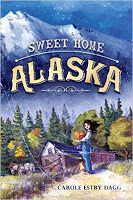
My friend Carole Estby Dagg, author of wonderful historical middle grade novels including THE YEAR WE WERE FAMOUS and the forthcoming SWEET HOME ALASKA, who has hosted a fabulous post on strong beginnings on Friday Feedback in the past, and I were chatting about critique groups and she offers this very helpful suggestion:
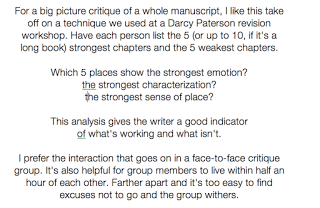 Click on the photo to open it larger on your screen.
Click on the photo to open it larger on your screen.I believe if we asked ten other writers, some of the most common refrains would be: be specific, set some group ground rules, and let others know what type of feedback you need!
Okay? Ready, Set, Go!
So, if you’d like to start a critique group where you live, or an online group, leave a comment here with the following information:
• Your name
• Where you are in your writing life: (beginner, long-time poet, working on 1st novel, agented nonfiction writer, etc.)
• What you’re working on now or what you most want to write: (YA fantasy, MG mystery, picture book biographies, professional books, poetry, etc. Or you can say not sure – a little of everything.)
• Where you live if you’re hoping for an in-person group, or just “Online” if you think connected via email will work out better. Or share both if you’re open to either of those.
If you’re intrigued by all this, but you’re not the kind of person who likes to start things, then you can just hang out and see if anyone posts a request for critique partners in your city, or if anyone who shares your passion for memoir is looking to form a group. If you see a comment from someone you’d like to chat with about forming a group, then reply to it and figure out how you’d like to continue the conversation from here forward (email, Facebook, etc.) to work out details.
Then I’d suggest you arrange to swap just a few pages of something for a sample critique, so that you can see how it works out and figure out if you’re compatible in this way.
Please don’t get stressed about this, okay? If no one answers your request right way, it doesn’t mean you’re a bad writer or that you smell like onions or anything else. We take things so personally as writers, don't we?! But sometimes it’s as simple as the fact that someone else is too intimidated, or simply missed your particular comment/request. If you don’t get any response here in the comments of this blog post, I’m also going to start a facebook thread and a twitter conversation under the hashtags #teacherswrite #critiquegroup
And remember: Critique groups have fits and starts, growing pains, and bumps in the road, so it may take a few tries before you connect with someone who is the right match. It’s worth it, though. You’ll get great feedback on your writing, you’ll learn a lot from critiquing your partners’ writing, and you’ll come away with some ideas that you can share in the classroom or library with kids who are trying to help one another improve their writing, too.
Ready to round up some critique partners? Fire away in the comments!
Kate & Gae
Published on July 29, 2015 06:41
July 23, 2015
Friday Feedback with Caroline Starr Rose: The Music of Language
 The real me. Shoving Banana Cream Pie in my mouth
The real me. Shoving Banana Cream Pie in my mouthafter a glorious birthday swim!
Is it just me, or is this summer flying faster than ever?
It's been a week. . . with both the saddest and most joyous of days. Through both, I have thought often of what it means to be a writer, how we pay attention to all of it, the big picture, and the small nuances, the broken, devastated moments, and the crystal clear blissful ones. How we are prone to insinuate our imaginary selves into every situation and ask questions. How often we want to race to find a scrap of paper, commit a line of prose to memory in our heads. How real writers never truly stop writing.
So for those of you who haven't put as many words down on paper (or up on screen) this summer as you hoped, please remember this:
Sometimes in our process we are still percolating our stories, or thoughts and ideas. Learn to sort this from pure procrastination. Learn to spend less time castigating yourself for not writing and use that realization and energy to plow yourself forward.
SO, having said that, today let's write some more! Let's share words, and passages. Look over your work and find a moment that reflects your Music of Language, or if you haven't written it yet, now is as good a time as any. Remember, sometimes you've written it, but you haven't revised it. It is often in the revision the real music begins to shine!
For more on this and what it all means, I am super excited to have one of the most poetic, musical writers I know,
 Caroline Starr Rose.
Caroline Starr Rose.Caroline is the author of two novels in verse,
MAY B.

and BLUEBIRDS,

and her beautiful, brand spanking new picture book, OVER IN THE WETLANDS, about which Kirkus says,

"This lyrical text uses interesting imagery, informal rhyme, and an insistent rhythm to describe the world of the bayou and the wonder of a storm..."
It's clear, then, that Caroline knows of what she speaks when she speaks to you now about writing with the music of language in your ear. So enough of me, here's Caroline:
A few weeks ago, I heard author / illustrator Betsy Jamesspeak at my local SCBWI chapter. Betsy has had decades of experience writing everything from picture books to young adult novels.
". . . a picture book author’s biggest obstacle has nothing to do with plot, character development, or conflict, but with an ear untrained 'to hear the music of language.'”
Part of her talk focused on the weaknesses we bring — knowingly or unknowingly — to our work. I found it especially interesting that Betsy felt a picture book author’s biggest obstacle has nothing to do with plot, character development, or conflict, but with an ear untrained “to hear the music of language.”
As someone who writes both verse novels and picture books, this musicality makes a lot of sense to me. The words used in verse and in picture books ideally do double duty, first in telling the story, second in helping the reader enter in. Because verse and picture books have so much in common, this idea of musicality serves authors who write in both formats. Here are a handful of ways we as readers, teachers, and writers can tune our ears and pencils to the rhythm of the spoken word.
Picture books are meant to be pleasant to the eye, ear, & tongue
Authors write novels for individual readers, but write picture books for a crowd. Reading a picture book is almost always a shared experience. The words should be pleasant to hear and say, satisfying young and old alike.
My boys are now fourteen and twelve, but I still remember lines from Mary Quattlebaum’s Underground Train:
The moving stairs roll us down, down, down to the underground train, which rushes past like fast water on miles of track. Rrrrruuummmmm. Whoooosshh.
I grip my fare and Mama grips my hand as the train doors slip aside like sliver drapes. We step inside: the doors slide shut.Rrrrrruuuummm. Whoooosshh.
Read those lines aloud and listen to how pleasant they sound, how fun they are to say.
Every word counts
Both verse novels and picture books major in brevity. This means that each word is selected with care. Winnow a manuscript down to its bare bones to find exactly what you need and what you don’t, as well as what you’re truly trying to say.
Rhyme is not dead
And neither is rhythm or repetition. This probably goes against everything you’ve heard about picture books, I know. While you certainly don’t need these poetic devices in your manuscript, you also don’t have to leave them out because you’ve heard the rumor books like this don’t sell.
"Your primary focus shouldn’t be your format but your story. Rhyme, repetition, and rhythm must always, always first and last serve the story . . . "
There are, however, a few things to keep in mind. Your primary focus shouldn’t be your format but your story. Rhyme, repetition, and rhythm must always, always first and last serve the story and not the other way. Notice what Mary Quattlebaum did above. She’s given us wonderful words to see, hear, and say, phrases like “rushes past like fast water on miles of track.” We’ve got ear-satisfying assonance with the words past, fast, and track. Just saying “past like fast” is awfully fun, as is “slip aside” and “step inside.” But as clever as these phrases are, they ultimately are helping us to experience the magic of Washington DC’s Metro. They sparkle and shine and engage us with purpose. Otherwise they’re meaningless.
Think musically!
Somehow, I’ve always viewed the picture books as second cousins to music (this is partially why Betsy’s idea resonated so deeply with me). Just as a picture book builds to a satisfying end, so does music, often using rhythm to set pace and tone and repetition to bring key musical phrases to the listener. An author can establish patterns to tell a story and then alter those patterns to build momentum.
"I love that the reviewer who read Wetlands for School Library Journal caught this, pointing out I 'var[ied] rhythmic patterns to mirror the storm’s energy.'”
My picture book, Over in the Wetlands: A Hurricane-on-the-Bayou Story, is a bit like a duel between the Louisiana coast and an approaching hurricane. I love that the reviewer who read Wetlands for School Library Journal caught this, pointing out I “var[ied] rhythmic patterns to mirror the storm’s energy.” As the storm passes, the original rhythm returns, building both familiarity and security for the reader and listener alike.
So, given that it's Friday Feedback, I'll share a sample from my picture book manuscript, Ride on, Will Cody! According to legend, Will Cody (later known as America’s greatest showman, Buffalo Bill) rode for the Pony Express at the age of fourteen. His longest ride covered 322 miles and required 21 horses. It was the third longest in Pony Express history.
I establish the setting and topic with rhythm and rhyme:
Night surrenders,first light embers,fiery sunriseway out west.
Horses nicker,heart beats quicker,saddle upfor the Pony Express. And later, as we near the climax, I build momentum by altering that pattern:
Gallop faster,short bit farther,last post spotted just up yonder,
don’t give up, keep steady, strong. Clutch the mail bag.Won’t be long!
I'd love you to share a moment where you use language lyrically to tell story, build momentum, and create tempo, if you've got something. Otherwise any small excerpt that shares the music of your language will do!
As for sharing, please remember to keep your excerpts BRIEF and follow the rest of the Friday Feedback RULES!
See you in the comments!
- Caroline & gae
Published on July 23, 2015 21:57
July 17, 2015
Friday Feedback with Amy Fellner Dominy - Character Mapping
Already Friday again!
Whew!!
I'm super happy today because I have one of my besties here -- or as we like to call ourselves "BVFEs" (You figure it out)!
Amy Fellner Dominy and I were both members of the Class of 2K11 now The Graduates, and we fell instantly in love with each other's writing, and it went from there.
Her first middle grade novel, OyMG (see what they did there?!?) and her second, AUDITION & SUBTRACTION are both chock full of wonderful characters searching for identity, and beautiful writing.
Amy is also an incredible "Beta reader" for me and I believe her insightful feedback on an earlier draft of THE SUMMER OF LETTING GO which sent me frantically revising, was substantially responsible for the book finally getting a deal.
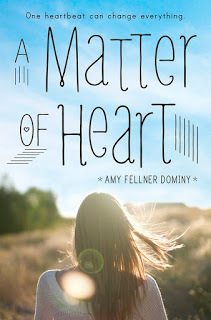 Amy's newest book, a YA this time, A MATTER OF HEART, follows 16-year old Abby Lipman who, on track to win the state swim championships and qualify for Olympic trials, learns she has a deadly heart condition.
Amy's newest book, a YA this time, A MATTER OF HEART, follows 16-year old Abby Lipman who, on track to win the state swim championships and qualify for Olympic trials, learns she has a deadly heart condition.Now, Abby is forced to discover who she is without the one thing that's defined her entire life.
School Library Journal said of A MATTER OF HEART, "More than a sports novel, this book delves deep into issues of identity... and the importance of support systems while making life-altering decisions."
I picked up a copy last week and, though I'm still finishing two other books, allowed myself to read the opening breathtaking chapter. It's so very good!
So, without further ado, here's Amy!**
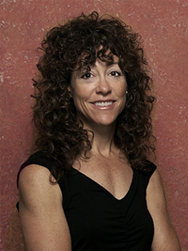
Good Morning!
I’m so glad you’re here for Teacher’s Write and Friday Feedback.
I’m really glad to be here, too!
Today, I want to talk to you about what I think is arguably the MOST important part of your story.
Your characters.
But before I get to that, I want to talk about how RIDICULOUSLY DIFFICULT it is to write a book.
"If you’re writing a book you’re juggling characters, problems, goal, stakes, dialogue, narrative, POV, action, setting, theme, symbolism, language, pacing, rhythm, style, grammar, rising tension, character arcs, growth, subplots, climaxes, denouements, beginnings, endings, middles—well, it’s like juggling ten octopuses who are juggling ten octopuses who are juggling."
I don’t want to be Debbie Downer here, but if you’re writing a book you’re juggling characters, problems, goal, stakes, dialogue, narrative, POV, action, setting, theme, symbolism, language, pacing, rhythm, style, grammar, rising tension, character arcs, growth, subplots, climaxes, denouements, beginnings, endings, middles—well, it’s like juggling ten octopuses who are juggling ten octopuses who are juggling. In other words, lots of balls in the air. So, when you can, if you can, wouldn’t it be nice to make things a little easier?
Which brings me back to our discussion of characters.
There are many ways to discover/develop your character and I’ve tried most of them over the years: character interviews, 5-page questionnaires, creating monologues, accosting strangers in the mall to ask about their lives (definitely don’t try that one) and on and on. But recently, I discovered another way that seems almost (dare I say it?) easy.
It’s called Character Mapping. I’m going to illustrate it here in case it might be something that will work for you, too.
Start with a blank piece of paper with a circle in the middle.

See how easy it is?
Now, inside of that circle, write down the thing that defines your character. Usually, it’s what they’re doing in your book. It might be a job, or if they’re a student than maybe it’s what they love to do. So, for example, in my novel A Matter of Heart, Abby is an elite swimmer.
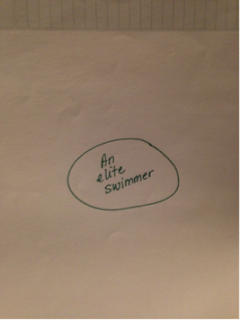
Now, brainstorm all the things that might define that person. Well, if you’re an elite athlete then you must be competitive and disciplined. You follow a certain regimen and you’re tanned from being in the sun and fit from all that exercise. You spend a lot of time in your sport, so your coach is a big part of your life and your friends are swimmers and so is your boyfriend. If you just start writing, you’ll be surprised at how many details come to you. And then there will be details for the details.
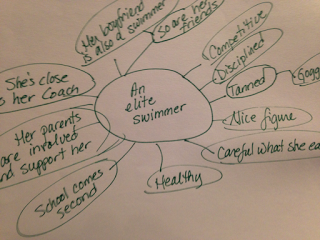
Now, here’s where it gets interesting. Take one of those attributes and flip it. Turn it around. Make it be the opposite and see what happens to your character—to your story. Because here is where you just might discover the main conflict of your book. It can be a real “ah ha” moment and one that sparks imaginative thinking. I can flip any one of those attributes and create conflict and questions for my character. Here’s the one I flipped.
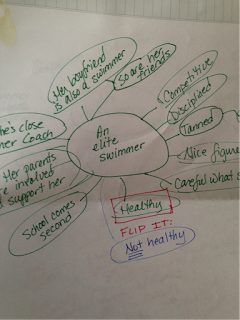
What if Abby, an elite swimmer, is NOT healthy. What would that mean to her—how could she compete? And what if she can’t? In the story, Abby discovers that even though she’s in the best shape of her life and on track to make the Olympic trials—she’s also sick. She has a heart condition and if she swims, she can die.
And that is an example of character mapping.
“But, Amy,” you say, “I can’t think of a concrete character trait to assign my character like being an elite swimmer. My character’s traits are more emotional, like she is anxious,” or “he feels unworthy” or “he's the class clown” or “she brightens people’s day.”
Don’t despair! Although character mapping works best if you can put something concrete in that center circle, if the main thing that defines your character is something emotional, the exercise can can still work. However, instead of a plot twist, you’ll likely flip a trait to discover the emotional arc or conflict or maybe even growth and change of your character.
Here’s an example from my new book, DIE FOR YOU, using an emotional trait.

Emma, the main character is a caretaker. By using that as the center point, I come up with behaviors that fit her. And while being a caretaker is a positive trait, every positive trait, taken to extremes, has the potential to become a negative. Can a person be too selfless? Too loyal? Of course, and that is where, for Emma, the problem eventually lies.
Note that, unlike in the first example where the flip will actually drive the plot of the story, here, because it’s the character’s emotional center that’s being flipped, the twist or conflict won’t likely turn up until a little later in the story.
So, give it a try and see if it works for you. Start with one thing you know about your character. Or if you haven’t even gotten that far, try creating a story from a character map. Start with TEACHER or LIBRARIAN in the center. (Hmmm, you might know one of those, right?) J
What are all the expected attributes of that person? What can you flip? And what problems does that create?
And now, since we’re here for Friday Feedback, and we’re talking about character traits and development, I thought I’d invite you to share a defining or pivotal character moment, and I’d share one from DIE FOR YOU, one which I hope reveals the essence of Emma, who she is and what she loves. What works for you? What doesn't? Does it compel you to want to read more?
If this is your first time posting, please read the FridayFeedback Rules at the bottom of that linked post!
I look forward to reading your words!
From DIE FOR YOU (Delacorte 2016):
Over the years, I’ve read so much about Pompeii I sometimes wake up hearing the screams of the people and tasting volcanic ash in my throat. To think that I could actually visit and maybe even volunteer makes my fingers itch. The collection of broken pottery and colored tile must be incredible. Pieces of the past waiting to be made whole. It’s what I’m good at, what I love most—fitting together jagged bits of pottery. Dad says it’s a gift I have, like a sculptor who can see a statue in a block of stone. I can picture the original shape of an artifact from just a few pieces, sense the patterns and designs before other people can. It’s the most amazing feeling in the world, too, when you put something back together—turn rubble into real.
-Amy (& gae)
p.s. a gentle reminder from Gae: please, please, please adhere to the 3 -5 paragraph limit for your excerpts as set out in the RULES, 3 if the paragraphs are long, 5 if shorter. Only more if the excerpt consists primarily of lines of dialogue. Several of you shared excerpts of well more last week, upwards of 400 - 500 words which, to put this in perspective, is more than a page and a half of writing. Multiply that by thirty or forty excerpts and that is a whole lot of reading to ask my guest authors to give thoughtful feedback on in one day!
Also be reminded that Amy is on Pacific time - 3 hrs earlier than me on NY time so will be here a bit later in the EST day! And she will only be here through today. I will continue to give feedback on excerpts posted through Saturday morning. After that, feel free to keep providing feedback for one another, but I will be moving on to preparing next week's post!
p.p.s. If you loved this post and learned from it, please buy, share, borrow Amy's titles and tell your friends about them!
Published on July 17, 2015 05:29
July 14, 2015
Tuesday Feedback: A Little Conversation about Book Reviews Starring YOU
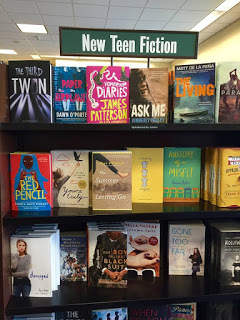
Book reviews are VERY important to us authors.
We count on word of mouth in all forms, from the readers who love us, to help spread the word.
New reviews going up on Amazon keep our books in the limelight. They actually play in to some mathematical algorithm that helps keep a book in the public eye. Blog post after article has been written on how to help the authors you love by writing reviews.
The point of this: WE NEED YOU!
Your reviews MATTER!!!
So, in addition to reading Kate, Jo, and me, and as many as our guest authors as possible, please do take the time to review the books you love even if it's simply a line or two.
Also, when authors come in to your classrooms or Skype with your students, please ask the students to put up reviews. Better yet, have them Tumblr, Snapchat or Instagram a photo of the book with a line about why they liked it, or post whichever new place our tweens and teens can be found.
So, yes, book reviews are super important, but what makes a good review?
What information sways you to search out and read a book versus pass it by?
During last week's Friday Feedback, I got this question about book reviews -- together with the below lovely review of THE SUMMER OF LETTING GO -- from one of our campers, and I decided I was not qualified to really answer it well, especially blinded by ego as I was after reading it [grin], and that it was best to shine the question back on you.
Tanja Galetti • 6 hours ago
Hi Gae and Martha,
Thanks for the inspiring post, for all the wonderful insights into the writing process, and for sharing something from one of your WIP . Since I don't have any stories to share, I was wondering whether it's okay for me to post a book review to get feedback on. A well written review gives me emotional chills, either in anticipation of a great story to read or in reliving the experience of reading the book.
"I read a lot and share reviews online, always feeling I don't give justice to the wonderful stories I read. My reviews lack this emotional chill, they don't capture what I really want to say."
I read a lot and share reviews online, always feeling I don't give justice to the wonderful stories I read. My reviews lack this emotional chill, they don't capture what I really want to say. I would like to get better at writing reviews and would love your feedback and ideas on where to start, how to go about it. Many thanks!Here's the review of one of Gae's books I read just a couple of days ago.
The Summer of Letting Go
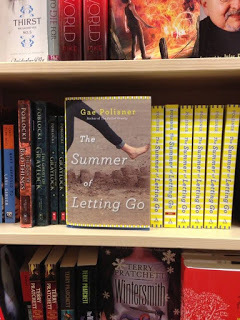 If you are like me and find comfort in reading, in that beautiful feeling of not being alone, that some books defuse, you will love and treasure the experience of reading The Summer of Letting Go.
If you are like me and find comfort in reading, in that beautiful feeling of not being alone, that some books defuse, you will love and treasure the experience of reading The Summer of Letting Go. Sometimes, life deals us a tough hand of cards, and we find ourselves stuck in situations, seemingly so hopeless, that we see no way out. And if on top of all, we feel entirely responsible for it, the guilt might push us into isolation, paralyze us with fear that if we confide in whoever is still near us, we would loose that person as well.
This is the situation Francesca, "Frankie", finds herself in after the tragic loss of her little brother, the crush on her best friend's boyfriend she desperately fights against, the fear of her dad planning to leave the family... So much to deal with and no one to confide in. I felt so close to Frankie throughout the book; she felt so real, her fears so tangible, her actions so understandable. Of course, I wished she would confide in her best friend Lizzette, I was convinced that her friend wouldn't let her down - but I also knew that if in the same situation I most probably, just like Frankie, wouldn't have had the courage.
What a beautiful book, that even though it deals with tragedy, with grief, with pain and fear, it is full of hope: "You keep on trying the best you can. And you know what? Sometimes life surprises you and rewards you for it more than you know. You never actually know what life will bring.” P. 256
First of all, Tanja, thank you for that lovely review. I hope you will put it up on Amazon and Goodreads, Barnes & Noble.com and Library Thing and anywhere else where you might see shared book reviews.
Second of all, I disqualify myself because quite frankly, I just felt like this after I read it:
 http://mobilegirlmim.tumblr.com/post/94713170867
http://mobilegirlmim.tumblr.com/post/94713170867Though I will say this one thing about me and reviews: I really love it when a reviewer quotes bits of writing or excerpts they love from the story, as it gives me a tiny taste of the writing, and ultimately, for me, it is writing that will almost always pull me in.
So what say YOU?
What makes a good review for you?
When you're reviewing, what are you trying to do?
How do you capture and share the essence of a story without giving the storyline away?
And most importantly, what sways you as the reader to run out and buy the subject book being reviewed?
If you are an avid reviewer, do you have a favorite review that you've written?
A favorite review site that you go to?
Feel free to share either your feedback or a review that you love in the comments.
You do not have to be a #teacherswrite camper to participate, and if you're a book blogger/reviewer you are welcome to share a link to your blog in the comments.
xox and thanks!
gae
Published on July 14, 2015 06:14
July 10, 2015
Friday Feedback: The Art of Persistence with the Awesome Martha Brockenbrough
Dear Campers,
Once in a while I read an author who truly makes me swoon with unabashed envy. Today, one such author, Martha Brockenbrough, is here.
 The chic and amazing Martha B.
The chic and amazing Martha B.
I have made no bones about hiding my crazy love for Martha and her book during the last few weeks on social media, and for your sake (lie: mine) I threw myself at her and groveled for her to come in the midst of her book-release craziness and host a Friday Feedback.
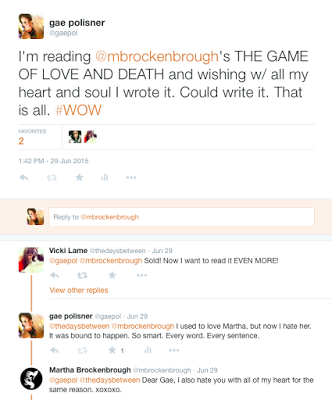 I fell in love with Martha, the person, on facebook, then fell in quick hate with Martha, the author, about one page in to her extraordinary novel The Game of Love and Death.
I fell in love with Martha, the person, on facebook, then fell in quick hate with Martha, the author, about one page in to her extraordinary novel The Game of Love and Death.
You know, the kind of mesmerized, green-eyed hate where, with each sentence you read, you start to question why you even bother to write.
No, really.
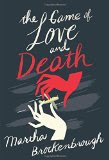 I am telling you this: if you read one book this summer, this is worthy of your read. . .
I am telling you this: if you read one book this summer, this is worthy of your read. . .
(luckily, I know you will all read more than one book and so won't have to pick and choose).
Kirkus' called Martha's prose "precise" and "luscious" and Booklist chimed in with "breathtaking." I think, so far, The Game of Love and Death has already garnered a well-deserved FOUR stars, and I give it FIVE HUNDRED more.
All I can tell you is this: I am three quarters of the way through it, and I have marveled on pretty much every page. What I know is I wish I wrote this book.
As I made my way through the early chapters, I started sending Martha notes. "But, HOW?!" I asked. "HOW did you think of this?" "... write this?" "HOW did you make this story happen?!"
So when she agreed to do Friday Feedback, I asked her to talk a little bit about that. So here she is, in a post she calls The Art of Persistence:
Starting a new book is a bit like starting a new romance.
You flirt with an idea. You move in closer. You give it the eye. It looks back at you and you just know. This … is the one.
As with love in the real world, though, the intoxication of possibility and potential eventually wears off, and you are left with a book that has morning breath and stubble, and those qualities that were perhaps endearing at first have become wearing.
But as I have told the couples I have married in my alternative life as an internet-ordained minister, love is fundamentally a choice you make every day. Whether your relationship succeeds, provided you’ve chosen a reasonable partner, is up to you.
This same thing is true with writing a book. And in all likelihood when you hit a rough patch, it’s not your book’s stubble, morning breath, or irritating qualities that are making you want to abandon ship. It’s your own darned self.
So here’s how to navigate that.
Step 1: Choose thoughtfully
I’ll stop belaboring the relationship metaphor soon, but you do want to choose wisely, both with partners and with books. Writing to a trend is like choosing a partner based on looks. This can seem necessary, but it rarely works out for the best in the long run.
" Do I have some notion of why this story is important to tell?"
Before you set out, ask yourself:
- Is this a story idea I love and will potentially be proud of for the rest of my life? - Is it one only I can write? - Can I imagine specific emotional moments for this character that give me the chills?- Do I have some notion of why this story is important to tell?
Step 2: Give yourself permission to think
It’s tempting, when you have a new idea for a novel, to jump right in. And a lot of good can come from this: excitement, the discovery of new things about your characters, the feeling that you’re attached to the skirts of a rocket-powered muse. If that’s helpful to you, go for it!
That’s what I did with The Game of Love and Death. I got to know the character of Love, who was my original starting point. I wanted to know what Love would think of humanity. What would give him hope. What would irritate him. I did always know my version of Love was a man—which was a good choice made instinctively (but often the sort of choice better made upon reflection). And I found his voice and point of view to be delicious.
I also knew I wanted to write the story of people who’d never not loved each other—but still struggled to be together. That gave me Henry and Flora, who initially were Sam and Isabel.
But I did not know who his antagonist was. I did not know the story would be better set in 1937. I also did not know that Flora was a pilot. Or even that she was black. In the first draft, it was contemporary and Flora was a white girl named Isabel, while Sam was a black boy. (He was always a bass player, though.)
Most important, I didn’t quite know how or where the story would end. To me, endings have to be unexpected but inevitable, and that is a hard balance to strike. It takes a lot of thinking to get there, and sometimes—especially in this day and age of public writing and declarations of word count—the desire to be in the frenzy of creation swallows us whole.
Then, when it spits us out as it inevitably does, we’re left with more anxiety and self-doubt than before.
Step 3: Know that anxiety and doubt are normal … and that they are allies
Sometimes the mere existence of anxiety and doubt make us think there is something wrong with us and our ideas.
This is false. In fact, there would be something deeply wrong with us if we never doubted. If we never feared. We would be insufferably arrogant. Reckless. Liable to produce garbage creatively and leave misery in our wakes personally.
So don’t fear these things—know they are inevitable and that they come bearing gifts.
"When fear and doubt arrive, ask them what they are trying to tell you."
When fear and doubt arrive, ask them what they are trying to tell you. Sometimes they’re saying that an idea isn’t fully cooked. That you are shying away from the depths you need to plumb. That you have not yet uncovered your characters’ real fears, and that you are sparing them the suffering that makes for a bad life, but for great reading.
Sometimes, they’re giving you the gift of greasy baloney: that you are not good enough, that you are incapable, that you have nothing of worth to say. Learn to recognize these and shut them down. You will be happier in every way once you’ve gotten rid of the alluring garbage peddlers in your life and work.
Step 4: Know where you are going—and that you aren’t actually writing a novel
Wait. What? You’re not writing a novel? Yes. Bear with me a moment.
There is no one way to write a novel. And every novel demands different tools. Some people plot extensively in advance. Some fly by the seat of their pants. But I can’t help but believe that even the blindest of fliers is heading in a particular direction.
For me, it helps very much to know where I am going, and the closer I get to the end, the more specific detail there is in my mental map.
"In any case, there is no such thing as writing a novel. There is writing a sentence. A paragraph. A scene. A chapter."
In any case, there is no such thing as writing a novel. There is writing a sentence. A paragraph. A scene. A chapter. These are challenges that can be managed on a daily basis. Just as relationships are sustained or spoiled by the daily choices we make, big projects like novels are the result of accumulated efforts.
As you write the novel, you also write yourself as a person who is brave, resourceful, persistent, and a welcome presence in the world. Here is this thing you are pulling from yourself. And while the process can sometimes feel like you’re yanking your guts through your left nostril with a crochet hook, the truth is you are adding love and beauty to the world without exploiting the planet’s resources or taking advantage of anyone in the process. This is a remarkable thing, and there is no one like you, no one able to do just what you do in the way you can do it. It doesn’t mean that you can’t do it better, but that again is nothing to fear. Don’t focus on the imperfections and inadequacies. Focus on the potential. Pardon my French, but that’s a f*cking exciting prospect and it is yours and yours alone.
"I revised the book 31 times."
So, know what you are about as much as you can (knowing you can always adjust later), and set a reasonable daily goal. It took me several years to write The Game of Love and Death. I revised the book 31 times. Had I known this at the outset, I might have been too intimidated or dispirited to proceed.
But I had an idea I believed in, and I managed to create sustaining moments in each day’s writing. A sentence I liked. A scene that thrilled me. An idea for work yet to come. And the knowledge that no one but me could write this book in the way I had imagined it.
This is not to say that every day was a basket of lavender-scented kittens. Far from it. But if you keep at your work knowing you are just swimming from one buoy to the next with the distant shoreline in mind if not in sight, then that is all you need.
Step 5: You don’t need to be perfect, just focused
Your goal when you’re struggling with that first draft is simply to finish it. Get to the end. When you finish things as a habit, you have the confidence you will finish this book, too, no matter how rough the going gets.
Most books require editing and revision, and lots of it. Yes, you will always hear stories of people whose books came to them in dreams or in three feverish weeks of typing. You sometimes hear people boast that they are so good at what they do they need only one draft to get the story right.
That may be true for those writers, but I think in general these tales and models are poison for the rest of us.
"The performance is not in the moment, but in the sum total of moments spent."
The beauty of writing as an art form, as opposed to something like music or dance, is that we can continue to improve and refine it over time. The performance is not in the moment, but in the sum total of moments spent.
We don’t have to get it right the first time or all at once. We can do our best and then resume work the next day (preferably after we have filled our emotional wells with rest, reading, exercise, companionship, and other good things).
It really doesn’t matter how long a book takes to write or how many drafts it demands. What’s important is the knowledge that you have something worth saying—story that adds something new to the world.
Readers, especially young ones, deserve our best efforts. So does literature. Bookshelves and bookstores are already overstuffed. If it’s not better than what’s out there already, a book shouldn’t be published. I believe time and thought are necessary ingredients to this process. And likewise, so are you. Just as you are, with all of the flaws and fears and sorrows and joys.
So go forth and write with everything you have, knowing both you and the world will be better for your efforts.
- Martha
So, there you have it, some wonderful gems from Martha to digest and hold on to.
When I read Martha's post, one of the things that resonated with me most was her question, "Can I imagine specific emotional moments for this character that give me the chills?" Such moments, in my writing, are often what inspire me to keep writing even when the rest of the story fills me with self doubt. As if such moments are proof that the character is worthy, even if the story hasn't quite yet settled around him or her.
In THE GAME OF LOVE AND DEATH, which you should run out and buy right now, there were so many moments that gave me chills as the reader. Two earlier ones come to mind, one in a gondola in Venice, between Love, Death and the Gondolier. The other, a moment surrounding the Hindenburg. Still now, just thinking about them, I get chills.
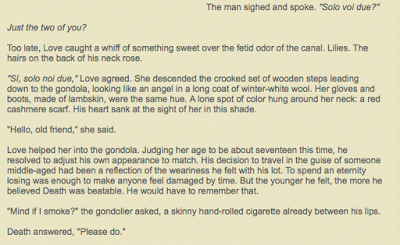 From THE GAME OF LOVE AND DEATH, Martha Brockenbrough
From THE GAME OF LOVE AND DEATH, Martha Brockenbrough
So, I thought, since it's Friday Feedback, I'd ask Martha to share one of those emotional moments from her new WIP, and I invite you to share the same pursuant to our Friday Feedback RULES. Share a brief moment that gives you, the writer, emotional chills.
PLEASE, if you haven't participated before and don't know the rules, STOP and click this link, scroll to the bottom of the post and READ the RULES and abide by them!
Martha will only be here today, but as always, I will read excerpts through Saturday.
Also, please note that Martha is in Seattle, so three hours earlier there! She won't be here until a few hours later EST .
So, without further ado, this excerpt, from Martha's yet-untitled WIP, an "experimental fairy tale with a non-human narrator, which will (probably) be set in medieval Germany and post Gold Rush Seattle. As with THE GAME OF LOVE AND DEATH," Martha adds, "Music, truth and love are core elements of the story."
The world emptied itself of everything unnecessary. There was nothing in front of me but this child. I touched her, and the song devoured me. I'd once seen an owl struck by lightning as it launched itself from a tree. Its entire body arched and sparked and turned white with the sheer power of it. I felt like that owl, and it was all I could do to remove my paw and remain conscious. (I cannot say the owl fared nearly as well, but you get my point.)I don't know how long I stood in thrall before Magnus's voice came from the shadows, where he liked to fiddle with his whiskers and observe the world. "You're a fool, Tomas.""Am I?" I pulled my paw away from the child and smoothed the fur on my cheeks. I suppose I was embarrassed, I am not proud to admit. And despite my question, I knew he was right.I was a fool. I remain a fool. I will ever be a fool for love. A fool, a soldier, a prophet, a martyr. If love makes a demand, I offer myself in my entirety.
Once in a while I read an author who truly makes me swoon with unabashed envy. Today, one such author, Martha Brockenbrough, is here.
 The chic and amazing Martha B.
The chic and amazing Martha B.I have made no bones about hiding my crazy love for Martha and her book during the last few weeks on social media, and for your sake (lie: mine) I threw myself at her and groveled for her to come in the midst of her book-release craziness and host a Friday Feedback.
 I fell in love with Martha, the person, on facebook, then fell in quick hate with Martha, the author, about one page in to her extraordinary novel The Game of Love and Death.
I fell in love with Martha, the person, on facebook, then fell in quick hate with Martha, the author, about one page in to her extraordinary novel The Game of Love and Death.You know, the kind of mesmerized, green-eyed hate where, with each sentence you read, you start to question why you even bother to write.
No, really.
 I am telling you this: if you read one book this summer, this is worthy of your read. . .
I am telling you this: if you read one book this summer, this is worthy of your read. . .(luckily, I know you will all read more than one book and so won't have to pick and choose).
Kirkus' called Martha's prose "precise" and "luscious" and Booklist chimed in with "breathtaking." I think, so far, The Game of Love and Death has already garnered a well-deserved FOUR stars, and I give it FIVE HUNDRED more.
All I can tell you is this: I am three quarters of the way through it, and I have marveled on pretty much every page. What I know is I wish I wrote this book.
As I made my way through the early chapters, I started sending Martha notes. "But, HOW?!" I asked. "HOW did you think of this?" "... write this?" "HOW did you make this story happen?!"
So when she agreed to do Friday Feedback, I asked her to talk a little bit about that. So here she is, in a post she calls The Art of Persistence:
Starting a new book is a bit like starting a new romance.
You flirt with an idea. You move in closer. You give it the eye. It looks back at you and you just know. This … is the one.
As with love in the real world, though, the intoxication of possibility and potential eventually wears off, and you are left with a book that has morning breath and stubble, and those qualities that were perhaps endearing at first have become wearing.
But as I have told the couples I have married in my alternative life as an internet-ordained minister, love is fundamentally a choice you make every day. Whether your relationship succeeds, provided you’ve chosen a reasonable partner, is up to you.
This same thing is true with writing a book. And in all likelihood when you hit a rough patch, it’s not your book’s stubble, morning breath, or irritating qualities that are making you want to abandon ship. It’s your own darned self.
So here’s how to navigate that.
Step 1: Choose thoughtfully
I’ll stop belaboring the relationship metaphor soon, but you do want to choose wisely, both with partners and with books. Writing to a trend is like choosing a partner based on looks. This can seem necessary, but it rarely works out for the best in the long run.
" Do I have some notion of why this story is important to tell?"
Before you set out, ask yourself:
- Is this a story idea I love and will potentially be proud of for the rest of my life? - Is it one only I can write? - Can I imagine specific emotional moments for this character that give me the chills?- Do I have some notion of why this story is important to tell?
Step 2: Give yourself permission to think
It’s tempting, when you have a new idea for a novel, to jump right in. And a lot of good can come from this: excitement, the discovery of new things about your characters, the feeling that you’re attached to the skirts of a rocket-powered muse. If that’s helpful to you, go for it!
That’s what I did with The Game of Love and Death. I got to know the character of Love, who was my original starting point. I wanted to know what Love would think of humanity. What would give him hope. What would irritate him. I did always know my version of Love was a man—which was a good choice made instinctively (but often the sort of choice better made upon reflection). And I found his voice and point of view to be delicious.
I also knew I wanted to write the story of people who’d never not loved each other—but still struggled to be together. That gave me Henry and Flora, who initially were Sam and Isabel.
But I did not know who his antagonist was. I did not know the story would be better set in 1937. I also did not know that Flora was a pilot. Or even that she was black. In the first draft, it was contemporary and Flora was a white girl named Isabel, while Sam was a black boy. (He was always a bass player, though.)
Most important, I didn’t quite know how or where the story would end. To me, endings have to be unexpected but inevitable, and that is a hard balance to strike. It takes a lot of thinking to get there, and sometimes—especially in this day and age of public writing and declarations of word count—the desire to be in the frenzy of creation swallows us whole.
Then, when it spits us out as it inevitably does, we’re left with more anxiety and self-doubt than before.
Step 3: Know that anxiety and doubt are normal … and that they are allies
Sometimes the mere existence of anxiety and doubt make us think there is something wrong with us and our ideas.
This is false. In fact, there would be something deeply wrong with us if we never doubted. If we never feared. We would be insufferably arrogant. Reckless. Liable to produce garbage creatively and leave misery in our wakes personally.
So don’t fear these things—know they are inevitable and that they come bearing gifts.
"When fear and doubt arrive, ask them what they are trying to tell you."
When fear and doubt arrive, ask them what they are trying to tell you. Sometimes they’re saying that an idea isn’t fully cooked. That you are shying away from the depths you need to plumb. That you have not yet uncovered your characters’ real fears, and that you are sparing them the suffering that makes for a bad life, but for great reading.
Sometimes, they’re giving you the gift of greasy baloney: that you are not good enough, that you are incapable, that you have nothing of worth to say. Learn to recognize these and shut them down. You will be happier in every way once you’ve gotten rid of the alluring garbage peddlers in your life and work.
Step 4: Know where you are going—and that you aren’t actually writing a novel
Wait. What? You’re not writing a novel? Yes. Bear with me a moment.
There is no one way to write a novel. And every novel demands different tools. Some people plot extensively in advance. Some fly by the seat of their pants. But I can’t help but believe that even the blindest of fliers is heading in a particular direction.
For me, it helps very much to know where I am going, and the closer I get to the end, the more specific detail there is in my mental map.
"In any case, there is no such thing as writing a novel. There is writing a sentence. A paragraph. A scene. A chapter."
In any case, there is no such thing as writing a novel. There is writing a sentence. A paragraph. A scene. A chapter. These are challenges that can be managed on a daily basis. Just as relationships are sustained or spoiled by the daily choices we make, big projects like novels are the result of accumulated efforts.
As you write the novel, you also write yourself as a person who is brave, resourceful, persistent, and a welcome presence in the world. Here is this thing you are pulling from yourself. And while the process can sometimes feel like you’re yanking your guts through your left nostril with a crochet hook, the truth is you are adding love and beauty to the world without exploiting the planet’s resources or taking advantage of anyone in the process. This is a remarkable thing, and there is no one like you, no one able to do just what you do in the way you can do it. It doesn’t mean that you can’t do it better, but that again is nothing to fear. Don’t focus on the imperfections and inadequacies. Focus on the potential. Pardon my French, but that’s a f*cking exciting prospect and it is yours and yours alone.
"I revised the book 31 times."
So, know what you are about as much as you can (knowing you can always adjust later), and set a reasonable daily goal. It took me several years to write The Game of Love and Death. I revised the book 31 times. Had I known this at the outset, I might have been too intimidated or dispirited to proceed.
But I had an idea I believed in, and I managed to create sustaining moments in each day’s writing. A sentence I liked. A scene that thrilled me. An idea for work yet to come. And the knowledge that no one but me could write this book in the way I had imagined it.
This is not to say that every day was a basket of lavender-scented kittens. Far from it. But if you keep at your work knowing you are just swimming from one buoy to the next with the distant shoreline in mind if not in sight, then that is all you need.
Step 5: You don’t need to be perfect, just focused
Your goal when you’re struggling with that first draft is simply to finish it. Get to the end. When you finish things as a habit, you have the confidence you will finish this book, too, no matter how rough the going gets.
Most books require editing and revision, and lots of it. Yes, you will always hear stories of people whose books came to them in dreams or in three feverish weeks of typing. You sometimes hear people boast that they are so good at what they do they need only one draft to get the story right.
That may be true for those writers, but I think in general these tales and models are poison for the rest of us.
"The performance is not in the moment, but in the sum total of moments spent."
The beauty of writing as an art form, as opposed to something like music or dance, is that we can continue to improve and refine it over time. The performance is not in the moment, but in the sum total of moments spent.
We don’t have to get it right the first time or all at once. We can do our best and then resume work the next day (preferably after we have filled our emotional wells with rest, reading, exercise, companionship, and other good things).
It really doesn’t matter how long a book takes to write or how many drafts it demands. What’s important is the knowledge that you have something worth saying—story that adds something new to the world.
Readers, especially young ones, deserve our best efforts. So does literature. Bookshelves and bookstores are already overstuffed. If it’s not better than what’s out there already, a book shouldn’t be published. I believe time and thought are necessary ingredients to this process. And likewise, so are you. Just as you are, with all of the flaws and fears and sorrows and joys.
So go forth and write with everything you have, knowing both you and the world will be better for your efforts.
- Martha
So, there you have it, some wonderful gems from Martha to digest and hold on to.
When I read Martha's post, one of the things that resonated with me most was her question, "Can I imagine specific emotional moments for this character that give me the chills?" Such moments, in my writing, are often what inspire me to keep writing even when the rest of the story fills me with self doubt. As if such moments are proof that the character is worthy, even if the story hasn't quite yet settled around him or her.
In THE GAME OF LOVE AND DEATH, which you should run out and buy right now, there were so many moments that gave me chills as the reader. Two earlier ones come to mind, one in a gondola in Venice, between Love, Death and the Gondolier. The other, a moment surrounding the Hindenburg. Still now, just thinking about them, I get chills.
 From THE GAME OF LOVE AND DEATH, Martha Brockenbrough
From THE GAME OF LOVE AND DEATH, Martha Brockenbrough
So, I thought, since it's Friday Feedback, I'd ask Martha to share one of those emotional moments from her new WIP, and I invite you to share the same pursuant to our Friday Feedback RULES. Share a brief moment that gives you, the writer, emotional chills.
PLEASE, if you haven't participated before and don't know the rules, STOP and click this link, scroll to the bottom of the post and READ the RULES and abide by them!
Martha will only be here today, but as always, I will read excerpts through Saturday.
Also, please note that Martha is in Seattle, so three hours earlier there! She won't be here until a few hours later EST .
So, without further ado, this excerpt, from Martha's yet-untitled WIP, an "experimental fairy tale with a non-human narrator, which will (probably) be set in medieval Germany and post Gold Rush Seattle. As with THE GAME OF LOVE AND DEATH," Martha adds, "Music, truth and love are core elements of the story."
The world emptied itself of everything unnecessary. There was nothing in front of me but this child. I touched her, and the song devoured me. I'd once seen an owl struck by lightning as it launched itself from a tree. Its entire body arched and sparked and turned white with the sheer power of it. I felt like that owl, and it was all I could do to remove my paw and remain conscious. (I cannot say the owl fared nearly as well, but you get my point.)I don't know how long I stood in thrall before Magnus's voice came from the shadows, where he liked to fiddle with his whiskers and observe the world. "You're a fool, Tomas.""Am I?" I pulled my paw away from the child and smoothed the fur on my cheeks. I suppose I was embarrassed, I am not proud to admit. And despite my question, I knew he was right.I was a fool. I remain a fool. I will ever be a fool for love. A fool, a soldier, a prophet, a martyr. If love makes a demand, I offer myself in my entirety.
Published on July 10, 2015 04:30
July 2, 2015
Friday Feedback: Will this be Your Summer to Be Brave?
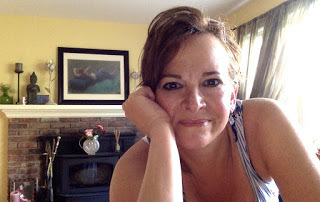 Come on in. The water is fine.
Come on in. The water is fine. It took me nearly 35 years to be brave.
To put myself truly out there in the world and try new things, believing I was capable of them.
Not that I was living under a rock or anything.
I mean, I had gone to law school, had a decent part-time career while I was raising my two little boys.
But write?
Be a writer?
That was a pipe dream, something I had tucked away long ago for more practical, attainable things.
So when the writing bug started to gnaw at my toes under the covers at night as I started to finally fall asleep, I made excuses, blamed others, thought, maybe in a few years because who has the time to do that NOW?

Oh, they were real excuses, grounded in fact:
First I was working full-time in big NYC law firms, then part-time (as many hours as I could muster the ability to focus primarily from home) while I had one still-colicky toddler who refused to sleep, and another baby ready to pop from my belly.
I don't have the hours in a day.
My husband doesn't encourage me enough.
I need to be exercising.
I should be cleaning the house. . .
Sound familiar?

Besides, WHAT DO *I* HAVE TO SAY?!?
I don't remember exactly what it was that got me from that thinking to sitting at my computer every night from the moment the dishes were done and my toddler had finally fallen asleep until the wee hours of the mornings to write my first manuscript. A manuscript that took me five years to write.
 All I do know is that it was a proverbial light bulb going off: I just woke up one morning, looked at the laundry list of excuses and suddenly knew they were just that. Viable ones, maybe. But, excuses nonetheless.
All I do know is that it was a proverbial light bulb going off: I just woke up one morning, looked at the laundry list of excuses and suddenly knew they were just that. Viable ones, maybe. But, excuses nonetheless.And I knew that the difference between people who do and people who don't was always going to be that those who do don't find the time, they MAKE it.
That first manuscript, THE JETTY, a piece of contemporary women's fiction, garnered some decent praise when I finally put it out there -- e.g. became a Top Semifinalist in the first ever Amazon Breakthrough Novel Award contest and even ultimately got me agented after two years of that unique hell that is agent-query rejection.
That manuscript, THE JETTY, now sits in a "drawer."
Unable to sell it, but now agented and encouraged, I wrote a second manuscript that my agent loved better, but that one, too, has never (not yet?) sold.
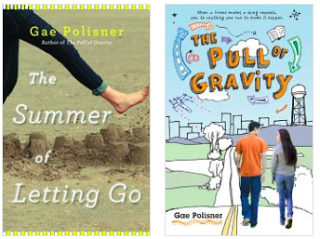
It was my third manuscript, THE PULL OF GRAVITY (a Bank Street Best of 2012, and, of course, a Nerdy Book Club* best, 2011. . . ) that sold to the legendary and extraordinary editor Frances Foster, at fsg.
And, after that, THE SUMMER OF LETTING GO (to the wonderful Elise Howard at Algonquin YR).
And news some of you might not know because we haven't announced the formal details yet. . .
but my third novel just sold and I'm uber excited about that!!!
For me, writing and selling good stories continues to be a, well, let's just call it a "less-than-simple endeavor." There are days (weeks, okay possibly months and years) when I fear that I will never write another sellable story again.
But this I have learned. This I KNOW: I sure never will if I don't keep trying, if I don't put myself out there to be brave.
That is, in fact, the spirit behind Friday Feedback. Why I started the feature a few years ago. Long before you heard of me, before Teacher's Write was a deliriously wonderful part of my summers.
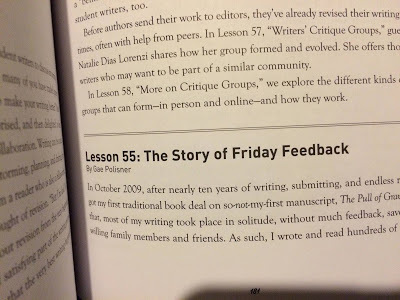 From 59 Reasons to Write by Kate Messner, with contributions from
From 59 Reasons to Write by Kate Messner, with contributions fromyour friendly Teachers Write authors!
Because I know that so much of what we do, we do in solitude, and getting feedback -- and encouragement -- is such an important part of the process.
The concept of Friday Feedback is simple: Brave is as brave does.
So we, the published authors, open ourselves up to the same constructive feedback we hope to give you. Because, yep, we still have doubts and fears, not to mention benefit from the eyes of objective readers who can help us to see both the flaws and the gems.
Please be clear that the feedback you receive here can be less than imperfect. Often the excerpts are from rough (ROUGH!) first drafts, and either way, it is nearly impossible to assess a piece of story out of context from just a brief few paragraphs. As such, the feedback offered must be taken as intended, with a grain of salt, as merely suggestive or "food for thought."
Having said that, over the years many have found it not only helpful and encouraging, but even exhilarating, so on we go!
Now.
Today.
YOU and me, together. Being brave.
Before we start, PLEASE READ ALL THE RULES (apologies, for the sudden highlighting. Blogger does that to me when I cut and paste):
At the end of each week's Friday Feedback blog post, my guest author or I will post a brief excerpt from a Work in Progress (WIP) and ask you for three specific pieces of feedback in the comments:
1. What works for you and why?
2. What doesn't work for you if anything, and why not?
3. If it's a beginning, does it hook you? If it's not a beginning, does it compel you to keep reading?
******Now, take a moment to read the order of those three questions again. *****
Notice the order !!!
If you are a teacher I beg of you, never grade or assess a student's writing without FIRST sharing something that works. Something the student has done well, or " right" before you correct them or offer constructive criticism as to what they've done "wrong."
And, yes, there is always something right. There are always gems to be found.
Hopefully over the course of this summer you'll see how much more open we all are to constructive criticism when we're first offered a bit of honest praise. . .
4. Once you have done that, you're invited to post your own BRIEF excerpt in the comments and we -- my guest authors and I, and even other Friday Feedbackers -- will offer you the same limited information in the comments.
5. By BRIEF, I mean brief. Regardless of how short or long OUR shared excerpts are, YOURS must be limited to between THREE and FIVE PARAGRAPHS and NO MORE. Five if they're short, three if they are long (if your paragraphs contain a lot of single-line dialogue, then do feel free to adjust this rule accordingly).
Please note that this Rule #5 is for our protection and yours. Ours because there can be 30 or more excerpts shared in a given day, and that's a whole lot of reading and feedbacking for my guest authors and me to give, and yours because I don't want there to be enough up there that, if someone "lifted" your words from my blog, you'd feel a significant piece of your story was plagiarized or stolen. We are on the the Wild West internets here, after all.
Once in while, in addition to the three pieces of feedback given above, I will do one of my patented "SUPER SPEED FLASH EDITS" on your excerpt if it lends itself to one, in which I will quickly eliminate unnecessary words that might bog the piece or pace down, change tenses, or combine sentences, etc., namely small fixes that can have big impact while not messing with your substantive word choices or own unique voice.
I do these when I hope they might serve to illustrate a concept that may help your -- and other campers' -- writing to pop and shine even more. If you don't want me to do a SSFE on your writing for any reason, speak up in a note or email to me, or forever hold your peace.
Oh, and last but not least, even though it is called Friday Feedback, I know many of you have summer jobs and commitments, and so you are welcome to post an excerpt through SATURDAY, and at least *I* (I can't guarantee my guest author) will give you feedback through the weekend. Please do NOT post past Saturday night, as by then I will already be preparing the post for the following week.
So, without further ado, here we go with ME in the hot seat. This excerpt is the opening of a YA ms I'm working on called (so far) THE SMALLEST SLICE.
What works? What doesn't? Does it hook you at all?
1. Late.
Jojo Bhatt is late.She enters the cool shadows of the steps to the subway, her heavy backpack slung over her shoulder. There’s not much in the backpack to make it so heavy. No textbooks or homework or anything.Jojo doesn't need those things today. Despite how it looks, she won’t be going to school, or back home later for that matter.Jojo descends the steps calmly, catching her muted reflection in the plexiglass frame of a poster for some new Broadway show. It is her father’s brown skin and black hair that blur by. No single trace of her mother. She moves faster so as not to catch the blur in the next panel – this for a new luxury condominium uptown somewhere. As she reaches the second flight of stairs, she hears a train roar in, the squeal of slowing brakes, the bing of the bell, the hydrolic hiss of the doors sliding open.Normally, she would run for it, but today she can be late. Today, she simply doesn’t care.When Jojo reaches the bottom and the entrance to the platform, the worker in the token booth, an older man with a shock of gray-white hair, turns and looks at her. She holds up her metrocard and scurries past, her heart starting up a little though she knows she has nothing to worry about. At school, she’d have a problem, wouldn’t get past the security guard or the metal detectors. But there are no bag checks or scanners here.
***
Happy summer 2015 all you shiny TW campers! So glad to have you here. . .
- gae
* if you teach kids reading or share books with kids and are not a member of the Nerdy Book Club, you are plain silly.
Published on July 02, 2015 21:09
June 19, 2015
On Hate and Things I Cannot Bear Nor Fathom. . .
I have no words for what has happened this week in Charleston, South Carolina, nor for what has happened before Charleston in Ferguson, in Florida, in Aurora, in Newtown, in Laramie, Wyoming, in NYC. . . everywhere, and seemingly will continue to happen because those of us with love in our hearts are so helpless and hapless or, worse, lethargic, in the face of those who are filled with hate, come from a place of ignorance or are, quite simply, inhumane.
I have no words today and so simply share the words of others who have found some profound ones, together with a strong wish and heartfelt plea that:
*you keep speaking up and out against intolerance, violence and hate, *you rally when possible, *if you are young, especially, you use your smarts, abilities and your words wisely and eloquently to sway others around you who may come from a place of fear or ignorance, and*MOST IMPORTANTLY, you VOTE. Vote for candidates who are first and foremost for tolerance, equality, and peace, who are for protecting lives not just IN the womb, but once they are born into the world and living and breathing among us.

If you watch or listen to one thing this week on the Charleston tragedy watch this:
JON STEWART on THE DAILY SHOW ON THE CHARLESTON SHOOTING.
And if you're still feeling hopeless after that clip watch the rest of his interview with Malala Yousafzai and consider donating to the Malala Fund.
If you read something, this is a good, important thing to read, with the below lead-in by the beautiful author, Kate Messner:
"What happened in a Charleston church on Wednesday night is a lot of things, but one thing it's not is "unspeakable." We should speak of it often. We should speak of it loudly." This piece is worth reading & thinking about. The man arrested for the horrific church shooting in Charleston may be referred to as a "lone shooter," but a community raised him. We are all responsible for the words we speak, the things we share on our social media pages, and the things we allow others to say, unchecked and unchallenged. I cannot believe we live in a world where this is still happening. We have to do better. SPEAKING THE UNSPEAKABLE. . .
If you are a writer and want to do something small to honor librarian Cynthia Hurd:
Donations in her memory can be made to the Charleston Public Library c/o Andria Amaral; Charleston County Public Library, 68 Calhoun St., Charleston SC 29401.
Mother Emanuel Church also accepts donations: http://www.emanuelamechurch.org/.

We must find a way to do better,
gae
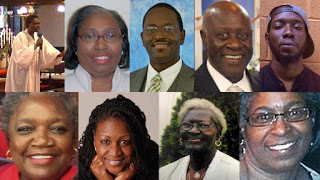
I have no words today and so simply share the words of others who have found some profound ones, together with a strong wish and heartfelt plea that:
*you keep speaking up and out against intolerance, violence and hate, *you rally when possible, *if you are young, especially, you use your smarts, abilities and your words wisely and eloquently to sway others around you who may come from a place of fear or ignorance, and*MOST IMPORTANTLY, you VOTE. Vote for candidates who are first and foremost for tolerance, equality, and peace, who are for protecting lives not just IN the womb, but once they are born into the world and living and breathing among us.

If you watch or listen to one thing this week on the Charleston tragedy watch this:
JON STEWART on THE DAILY SHOW ON THE CHARLESTON SHOOTING.
And if you're still feeling hopeless after that clip watch the rest of his interview with Malala Yousafzai and consider donating to the Malala Fund.
If you read something, this is a good, important thing to read, with the below lead-in by the beautiful author, Kate Messner:
"What happened in a Charleston church on Wednesday night is a lot of things, but one thing it's not is "unspeakable." We should speak of it often. We should speak of it loudly." This piece is worth reading & thinking about. The man arrested for the horrific church shooting in Charleston may be referred to as a "lone shooter," but a community raised him. We are all responsible for the words we speak, the things we share on our social media pages, and the things we allow others to say, unchecked and unchallenged. I cannot believe we live in a world where this is still happening. We have to do better. SPEAKING THE UNSPEAKABLE. . .
If you are a writer and want to do something small to honor librarian Cynthia Hurd:
Donations in her memory can be made to the Charleston Public Library c/o Andria Amaral; Charleston County Public Library, 68 Calhoun St., Charleston SC 29401.
Mother Emanuel Church also accepts donations: http://www.emanuelamechurch.org/.

We must find a way to do better,
gae

Published on June 19, 2015 07:09



